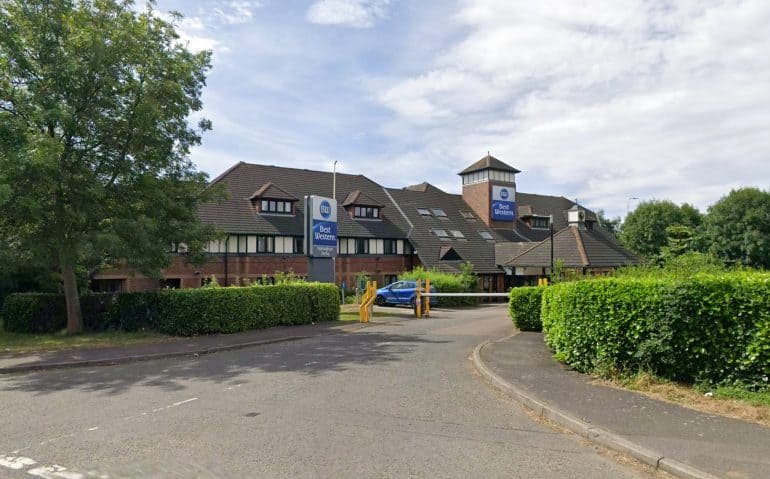-
 play_arrow
play_arrow
Erewash Sound Love Music - Love Erewash
-
 play_arrow
play_arrow
Writing East Midlands talks about their pivotal role in supporting creatives, in professional & community settings, in the East Midlands. They also discuss their local role within the national initiative "Beyond the Spectrum". Erewash Sound
PCC pledges to increase awareness of stalking and harassment behaviour as the UK observes National Stalking Awareness Week
today24 April 2025

Police and Crime Commissioner Nicolle Ndiweni-Roberts held a meeting with stalking advocates to review recent progress to better protect victims as the nation marked National Stalking Awareness Week.
The Derbyshire PCC met representatives from Derbyshire Constabulary and domestic abuse charities Glow and Crossroads for an update on the innovative work underway to enhance the care and protection of victims of stalking and harassment across Derbyshire.
The Commissioner is concerned that many people still do not recognise or understand what constitutes stalking and harassment behaviour, especially among the younger generation, and is determined to raise awareness of these behaviours to encourage victims to seek help at the earliest opportunity.
The meeting heard that during recent school engagement visits, many young people said they would only become concerned if they were called by a perpetrator more than 100 times when the legal threshold of a case being classified as stalking is just two calls.
This misunderstanding and downplaying of stalking behaviours is one of the biggest barriers to protecting victims and getting people the help they need, and the PCC told the representatives she was keen to raise further awareness of the signs of this offending.
She also said that it was worrying to learn that national statistics reveal that one in five women have been victims of stalking. She added that further work was needed to encourage male victims to report their experiences after hearing that many did not recognise themselves as stalking victims and that one in 11 men have been victims of stalking.
Nicolle Ndiweni-Roberts said: "Stalking and harassment are serious crimes that can inflict psychological terror on victims. In some cases, stalking behaviours can escalate to serious physical harm and in some cases loss of life.
"I am reassured that every effort is being made in Derbyshire to identify victims of stalking and harassment early, and that officers are utilising their powers and legislation to maximum effect to safeguard and help those impacted.
"Stalking is often a hidden crime, with many victims unaware that this behaviour constitutes a crime, and this must change. Clearly, we need to consider how best to improve awareness so that more people identify and recognise themselves as victims and come forward with confidence that they will be supported, believed and directed to specialist help.
"As Commissioner, I will continue to work closely with partners to improve awareness around stalking and harassment behaviours to help more people recognise the signs of these appalling crimes earlier."
Stalking offences have seen a small rise of 0.5% over the past 12 months in Derbyshire which represents 16 cases.
The meeting heard that the force is making ongoing improvements to crime recording systems to accurately record stalking incidents while stalking training has already been introduced into the Police Constable Entry Programme.
The Repeat and Serial Offenders' team, which is being rebranded as the Harm Reduction Unit, currently oversees 77 active Stalking Protection Orders. These are civil orders that prohibit the stalker from contacting a victim in any way, going to locations where they live, recording images of the victim and other behaviour.
Crossroads Derbyshire launched a non-domestic abuse stalking advocacy service, funded by the OPCC, in April 2023 in the High Peak and Derbyshire Dales areas which has since been expanded to cover the whole of Derbyshire except the City.
So far, 62 victims of stalking have been supported.
The charity already provides a stalking advocacy service for victims of domestic abuse.
What is stalking and harassment?
Stalking and harassment are similar offences where someone repeatedly behaves in a way that makes a person feel scared, distressed or threatened. If this behaviour happens two times or more, it may be a crime and should be reported to the police.
Stalking is a form of harassment in which the stalker is obsessed with the person they are targeting. Behaviour could include following someone, going uninvited to their home, hanging around somewhere they know the person visits, watching or spying on someone and writing or posting online about someone if it is unwanted.
Harassment may include sending abusive text messages or imagines, posting abusive messages on social media, neighbour disputes involving abuse behaviour or damage to property, repeated antisocial behaviour or making unwanted or offensive phone calls.
Online stalking or harassment is when someone monitors, stalks, harasses, threatens, controls or impersonates another person online or using other technology. They may monitor someone's internet use or email, send you photos of genitals without your permission, steal someone's identity, gain access to your email or social media accounts or threaten to share private information, photographs and copies of messages or add tracking software to your devices.
Love bombing is a tactic where someone overwhelms another person with excessive attention, affection and praise, usually to gain control or to manipulate them and can form part of the cycle of abuse. The Crown Prosecution Service now recognises love bombing in its guidance on abuse and coercive and controlling behaviour in relationships. Love bombing can involve grand gestures, declarations of love early in a relationship and excessive compliments, texts or calls.
For more information on how to report stalking or harassment in Derbyshire, click here.
Written by: Erewash Sound
Similar posts
Sponsors
ON AIR
SEARCH
CATEGORIES
RECENT POSTS

Government announces support package that backs British pubs

Mayor plays down £400m plan for trams coming to Derby (Consultation runs to 8th February)

DCG seeks employers to support T-level marketing industry placements

Drug and alcohol dependency support to be given a funding boost

Broken planning system must be fixed says Chamber as it backs report calling for overhaul
103.5 & 96.8 FM
LOVE MUSIC
LOVE EREWASH
Office: 0115 888 0968
Studio: 0115 930 3450
Erewash Sound, The Media Centre, 37 Vernon Street, Ilkeston, DE7 8PD
© Copyright 2026 Erewash Sound CIC. All Rights Reserved. Company Number 6658171.






